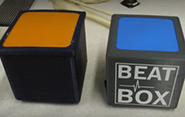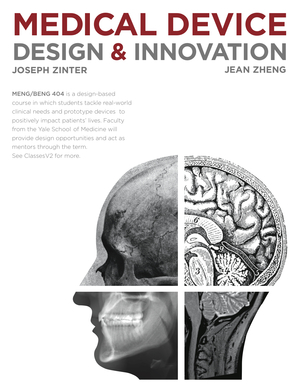More Medical Devices Of The Future From MENG/BENG 404

The student teams of Medical Device Design and Innovation (MENG/BENG 404) recently presented what could be the next breakthroughs in medicine.
 Co-taught by Dr. Joseph Zinter, assistant director of the Center for Engineering Innovation & Design, and Dr. Jean Zheng, engineering director at the Center for Biomedical and Interventional Technology (CBIT), the course brings together interdisciplinary teams of students to with physicians from the Yale School of Medicine and Yale-New Haven Hospital to address unmet clinical needs.
Co-taught by Dr. Joseph Zinter, assistant director of the Center for Engineering Innovation & Design, and Dr. Jean Zheng, engineering director at the Center for Biomedical and Interventional Technology (CBIT), the course brings together interdisciplinary teams of students to with physicians from the Yale School of Medicine and Yale-New Haven Hospital to address unmet clinical needs.
The teams presented their projects at the CEID a few days before the holiday break:
- The BeatBox, a device designed to be a more realistic patient simulator for training medical professionals. It features a silicone sheet to simulate skin and a speaker to simulate the pulse. There's also a layer of hydrogel to simulate all the tissues and fat that can make finding a pulse difficult. Dr. Linda Honan, associate professor of nursing at the Yale School of Nursing, and Dr. Stephanie Sudukoff, director of the Yale-New Haven Hospital Simulation Center, advised the team.
- Studies have shown that bone marrow biopsies result in pain in 70 percent of all cases, and extreme pain 35 percent of the time. So one team presented a device designed to be more accurate, and subsequently, less painful. The team was advised by Dr. Elliott Brown, assistant professor of radiology and biomedical imaging.
- After an organ transplant is completed, a patient's journey is far from over. There are medicines to keep track of, frequent medical appointments and many other logistics. One team devised VIP Transplant, an app that would help patients manage their appointments, interact with their transplant team and gain access to their medical information. Dr. David Mulligan, chief of transplantation & immunology at Yale-New Haven Hospital, served as the team's advisor.
- Gall bladder surgeries can mean one to three days in the hospital, and often a great deal of pain for patients. Advised by Dr. Kurt Roberts, associate professor of gastrointestinal surgery, a student team created GalVac, designed to allow doctors to make fewer incisions, move the procedure from the surgery suite to outpatient clinics, and create less pain for patients.
One of the many projects that have come out of the Medical Device Design and Innovation course in past years is a new transportation device for intestines, designed to better preserve the organ and improve the chances of a successful transplant. It led to the start-up company Revai, which is expected to have a product on the market by 2018.

